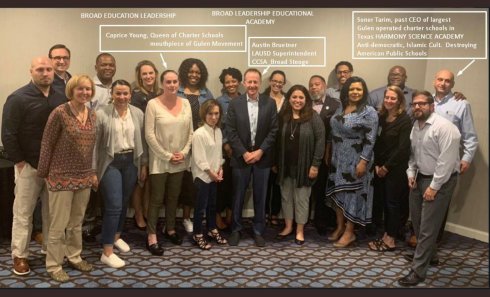“Schools will be closed until at least April 20, after the
upcoming spring break, but could stay closed for significantly longer, Mr. de
Blasio said.”
When I read those words in the New
York Times article announcing that New York City schools would finally
close, I had a sick feeling in the pit of my stomach. For the past few days, I
have been a vocal advocate for closing NYC schools. Knowing the impact that closing
schools would have on marginalized children and their families who only have public
education as their sole safety net, I still believed that we must close the
schools to stop the spread of COVID-19. But then it hit me that for some
disaster is the only way to fundamentally alter public education. Disaster
capitalism is what Naomi Klein warned us about in her book The Shock
Doctrine. And we’ve seen this play out in New Orleans after Hurricane
Katrina and in Puerto Rico after Hurricane Maria (they also tried in Houston
but not sure how far they got). As that sick feeling in the pit of my stomach grew,
one question formed in my mind: how many schools would not reopen as
traditional public schools when this is all over?
Many children will do well online. Some will not. Many
teachers will enjoy teaching online. Some will not. Many districts will like
the benefits of online schooling. Some will not. I can’t predict the future,
and neither can you. But what we can do is learn from history and history teaches
us that public education is ripe for those who want to implement significant
changes during the time of a disaster. So even if you think this can’t happen,
I assure you some intend to make it happen whether you like it or not.
Some people immediately responded that everything would return
to normal because parents need their children to go back to school, so this online
schooling can’t last forever. But online schooling doesn’t have to happen at
home. Online schooling can take place in a school building and still be very
profitable for disaster capitalists. Now that they made sure to place a computer
or a tablet in the hands of every child to have during the quarantine, do you
really believe they will not want them used once students return to school? Or
will they now have the data to back up their claims that personalized learning
through technology is the future? Will they now have a solution to the teacher
shortage, union demands, and need to fund pensions? Can they now show the
consumer, parents, that this is better for their child than traditional face-to-face
instruction?
So, what can we do now? I suggest we closely monitor the new
laws exempting school districts from state testing and mandatory instruction
days. What other riders are being added? What deals are tech companies making
with schools to get the technology to the students? What does the contract say
for after the pandemic ends?
We must also collect our own data. What issues did we face
moving to online schooling? How did students feel? How did parents feel? What
worked and what didn’t work? What cannot be replaced through online schooling?
We must collect and share our own data if we are going to tell our own story.
I believe education does need to fundamentally change. The current
system cannot serve who we will be in the future. We don’t need a generation of
children who can memorize facts for a world that assumes life is a competition to
determine who is smarter than a fifth-grader. The purpose of education is not
to pass a standardized test to get into college. We need to move away from
producing knowledge consumers to helping all children be knowledge producers.
And that will take a fundamental change in how we approach education. So, I
welcome change. But I don’t welcome the kind of change that disaster capitalism
will force on us. That change is all about increasing the profits of a few at
the expense of the many. That change will not improve our current system but
replace it with a system that is profitable to the powers that be to make education
a commodity. We know that education is a priceless human right, and we must do
what we can to protect it.
I know there are immediate challenges regarding what to do
right now in the face of this pandemic. What about seniors? Will they graduate?
Will all students move on to the next grade? How will we know they are ready?
These are valid questions that require collaborative thinking and innovative
approaches to deciding how to move forward in an unprecedented era. What we can’t
do is allow online schooling to be the only solution forced upon us. If we can
rewrite laws to waive mandates for instruction and testing requirements, we can
make sure all students graduate and promoted to the next grade. We can restructure what the next grade looks
like to account for the impact this pandemic is having on the current school
year. We can decide that this is our
summer break and resume regular school in July (don’t hate me I love summer too,
but we’re thinking outside of the box). We can create unique assessments that
ask students to demonstrate what they know and have learned and show us that
they are ready to graduate or go on to the next grade. We can answer all these
questions without allowing ed-tech companies to tell us that online schooling
is the only option.
I hope that I am wrong. I hope that all schools reopen before
the year ends, and everything goes back to normal. Actually, I lied. I don’t
want a return to the status quo that doesn’t help most children. I don’t want a
traditional public-school system that reinforces racism, sexism, heterosexism,
classism, ableism, and all other types of oppression. I don’t want a public-school system that is
underfunded and expected to provide food, safety, and counseling to all
children. I don’t want a profession that
is disrespected daily and abused because of their natural dispositions to care for
others. I want the Great Equalizer that schools
are supposed to be. I want the institution that welcomes all students, cares
for them, educates them, and prepares them to be active citizens. I want education
for liberation, not schooling for capitalism.
Disaster Capitalism is knocking on the public education
door. The best we can do is answer the knock on the door by using this pandemic
to produce the schools we deserve. The least we can do is ignore the knock and
let disaster capitalism do its thing. I know what I’m going to do. What about
you?
Denisha Jones is the Director of the Art of Teaching Program
at Sarah Lawrence College. She serves as the interim Assistant Executive Director for the Badass Teachers Association and as the Director of Early
Childhood Organizing for Defending the Early Years, Inc. Since 2017,
she served on the steering committee for the national Black Lives Matter at
School Week of Action. In 2019, Dr. Jones joined the Anji Play Study Fellowship
program where she will learn about true play from the Anji province in
China and become an Anji Play Ambassador.





